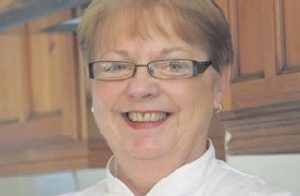Role: Cookery Demonstrator
Company: The Livestock and Meat Commission for NI
Track Record: Bridghe qualified as a teacher of Home Economics in the 70s and taught Home Economics in St Mark’s High School, Warrenpoint until 2004. She held the post of head of department for most of that time and experienced many changes in her roles during that per
THE POST
Cookery demonstrator with the Livestock and Meat Commission for Northern Ireland
THE POST HOLDER
Bridghe Reilly
7AM
My day usually starts around 7.am. Shower, breakfast and if time permits a 45 minute walk from my home along the seafront of Warrenpoint which is, in my opinion one of the most scenic walks in Northern Ireland.
9.AM
Check emails from schools followed by telephone calls to teachers who have requested demonstrations, and initially arranging dates and suitable times for demonstrations. The telephone call extends into discussions how my demonstration will link into the Northern Ireland Home Economics Curriculum. All arrangements are confirmed by email that same day.
10AM
Prepare for a demonstration — collect and pack the ingredients, equipment, LMC recipe booklets and information leaflets for each pupil in the demonstration.
11.30AM
Arrive at the appointed school where I am quickly escorted to the Home Economics Department. Schools are very busy and regimented to the ‘bell’ so I must work quickly to set up and be ready for the arrival of the pupils. The teachers are always pleased to welcome you to their school and will have a coffee and brief chat on the nutritional aspects of the curriculum they want you to cover. Today it is a Year 10 class and they are studying the importance of red meat as part of a balanced diet.
MIDDAY
The bell announces the arrival of the pupils for the demonstration. After a brief introduction I begin the demonstration. The main purpose of the schools’ cookery demonstrations is to make pupils, the consumers of the future, aware of the Northern Ireland Farm Quality Assurance Scheme (NIFQAS) and accompanying logo and also to educate young people about the nutritional benefits of consuming red meat as part of a balanced diet. I encourage pupils and their parents to look out for the NIFQA logo in their local butchers and supermarkets. This ensures that the beef is traceable and verifies that it is produced on farms that meet high European standards. The beef and lamb cookery demonstrations play an important role in supporting the home economics syllabus and help consumers at a young age to understand the products of our agriculture industry, an industry worth over £4bn to the economy annually. We also assist our farmers and processors in relaying the message about the farm end of the production chain and the three pillars of Farm Quality Assurance — food safety, animal welfare and care for the environment. Once I have given the pupils an overview of the session I prepare and cook the two dishes that the pupils will later sample. This preparation and cooking is interspersed with questions to the pupils to as-certain their level of knowledge and impart new knowledge. The part I find most enjoyable is the interaction between the pupils and myself. A lot of the schools I demonstrate in have a rural population and the comments from the future young farmers and consumers are enlightening and often amusing. Quite often the pupils have their own cattle and rare breeds of sheep. And as often as not I am on the receiving end of their very practical knowledge. The demonstration ends with a sampling session of the two dishes. There is never any food left over. The recipe booklets are given out followed by a plenary question and answer session. Lastly, there is a quick reminder about LMC’s educational website ‘Food 4 Life’ and their exciting new site beefandlamb-ni.com where pupils can find a whole host of beautiful recipes to try.
1.30PM
Debrief with the class teacher, clean up, pack up and on to next task. Brief lunch with the members of the home econom-ics department and then pack car and head home.
2.00PM
On way home go to local supermarket to purchase the ingredients for the next demonstration. I always make sure when buying the beef or lamb that it is NIFQAS. Home, unpack car, have a welcome cup of tea while completing the paperwork, invoices and my own evaluation of the demonstration.
4.30PM
Time to look after those at home. Prepare and cook dinner for 5.30pm.
7.00PM
Relax with cup of coffee, make contact with family and friends on the phone. Read, relax and catch up with favourite programmes on TV. No demo tomorrow so don’t have to set the alarm so early. Bed and then a welcome sleep for me.


